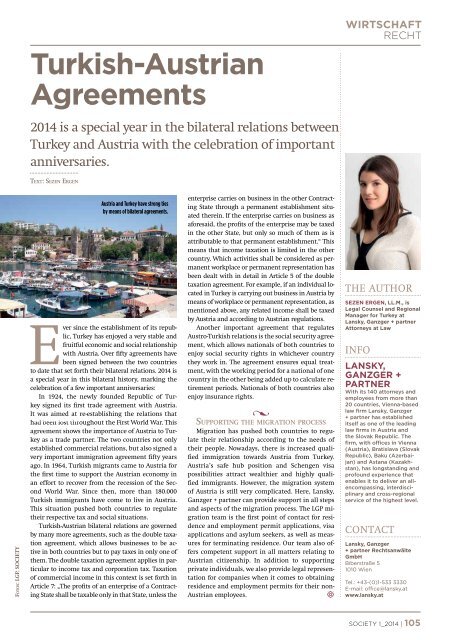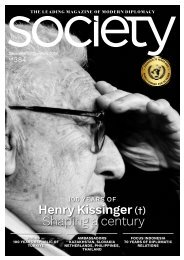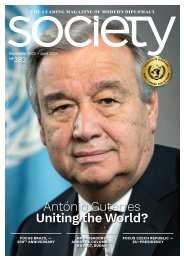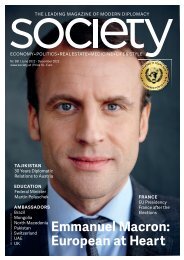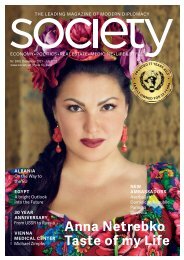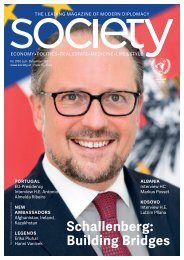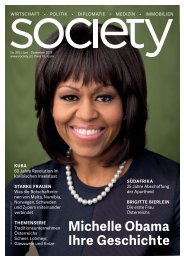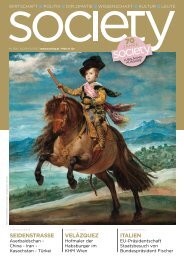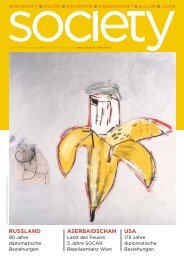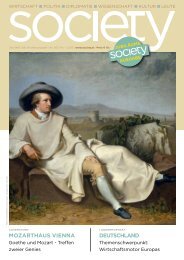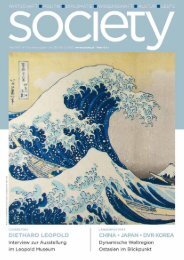Society 365 / 2014
Sie wollen auch ein ePaper? Erhöhen Sie die Reichweite Ihrer Titel.
YUMPU macht aus Druck-PDFs automatisch weboptimierte ePaper, die Google liebt.
Turkish-Austrian<br />
Agreements<br />
<strong>2014</strong> is a special year in the bilateral relations between<br />
Turkey and Austria with the celebration of important<br />
anniversaries.<br />
WIRTSCHAFT<br />
RECHT<br />
Text: Sezen Ergen<br />
Fotos: LGP, SOCIETY<br />
Austria and Turkey have strong ties<br />
by means of bilateral agreements.<br />
Ever since the establishment of its republic,<br />
Turkey has enjoyed a very stable and<br />
fruitful economic and social relationship<br />
with Austria. Over fifty agreements have<br />
been signed between the two countries<br />
to date that set forth their bilateral relations. <strong>2014</strong> is<br />
a special year in this bilateral history, marking the<br />
celebration of a few important anniversaries:<br />
In 1924, the newly founded Republic of Turkey<br />
signed its first trade agreement with Austria.<br />
It was aimed at re-establishing the relations that<br />
had Turkey been and Austria lost throughout have the First World War. This<br />
very good business<br />
agreement shows the importance of Austria to Turkey<br />
as a trade partner. The two countries not only<br />
relations<br />
established commercial relations, but also signed a<br />
very important immigration agreement fifty years<br />
ago. In 1964, Turkish migrants came to Austria for<br />
the first time to support the Austrian economy in<br />
an effort to recover from the recession of the Second<br />
World War. Since then, more than 180.000<br />
Turkish immigrants have come to live in Austria.<br />
This situation pushed both countries to regulate<br />
their respective tax and social situations.<br />
Turkish-Austrian bilateral relations are governed<br />
by many more agreements, such as the double taxation<br />
agreement, which allows businesses to be active<br />
in both countries but to pay taxes in only one of<br />
them. The double taxation agreement applies in particular<br />
to income tax and corporation tax. Taxation<br />
of commercial income in this context is set forth in<br />
Article 7: „The profits of an enterprise of a Contracting<br />
State shall be taxable only in that State, unless the<br />
enterprise carries on business in the other Contracting<br />
State through a permanent establishment situated<br />
therein. If the enterprise carries on business as<br />
aforesaid, the profits of the enterprise may be taxed<br />
in the other State, but only so much of them as is<br />
attributable to that permanent establishment.“ This<br />
means that income taxation is limited in the other<br />
country. Which activities shall be considered as permanent<br />
workplace or permanent representation has<br />
been dealt with in detail in Article 5 of the double<br />
taxation agreement. For example, if an individual located<br />
in Turkey is carrying out business in Austria by<br />
means of workplace or permanent representation, as<br />
mentioned above, any related income shall be taxed<br />
by Austria and according to Austrian regulations.<br />
Another important agreement that regulates<br />
Austro-Turkish relations is the social security agreement,<br />
which allows nationals of both countries to<br />
enjoy social security rights in whichever country<br />
they work in. The agreement ensures equal treatment,<br />
with the working period for a national of one<br />
country in the other being added up to calculate retirement<br />
periods. Nationals of both countries also<br />
enjoy insurance rights.<br />
•<br />
Supporting the migration process<br />
Migration has pushed both countries to regulate<br />
their relationship according to the needs of<br />
their people. Nowadays, there is increased qualified<br />
immigration towards Austria from Turkey.<br />
Austria’s safe hub position and Schengen visa<br />
possibilities attract wealthier and highly qualified<br />
immigrants. However, the migration system<br />
of Austria is still very complicated. Here, Lansky,<br />
Ganzger + partner can provide support in all steps<br />
and aspects of the migration process. The LGP migration<br />
team is the first point of contact for residence<br />
and employment permit applications, visa<br />
applications and asylum seekers, as well as measures<br />
for terminating residence. Our team also offers<br />
competent support in all matters relating to<br />
Austrian citizenship. In addition to supporting<br />
private individuals, we also provide legal representation<br />
for companies when it comes to obtaining<br />
residence and employment permits for their non-<br />
Austrian employees.<br />
•<br />
THE AUTHOR<br />
SEZEN ERGEN, LL.M., is<br />
Legal Counsel and Regional<br />
Manager for Turkey at<br />
Lansky, Ganzger + partner<br />
Attorneys at Law<br />
INFO<br />
LANSKY,<br />
GANZGER +<br />
PARTNER<br />
With its 140 attorneys and<br />
employees from more than<br />
20 countries, Vienna-based<br />
law firm Lansky, Ganzger<br />
+ partner has established<br />
itself as one of the leading<br />
law firms in Austria and<br />
the Slovak Republic. The<br />
firm, with offices in Vienna<br />
(Austria), Bratislava (Slovak<br />
Republic), Baku (Azerbaijan)<br />
and Astana (Kazakhstan),<br />
has longstanding and<br />
profound experience that<br />
enables it to deliver an allencompassing,<br />
interdisciplinary<br />
and cross-regional<br />
service of the highest level.<br />
CONTACT<br />
Lansky, Ganzger<br />
+ partner Rechtsanwälte<br />
GmbH<br />
Biberstraße 5<br />
1010 Wien<br />
Tel.: +43-(0)1-533 3330<br />
E-mail: office@lansky.at<br />
www.lansky.at<br />
SOCIETY 1_<strong>2014</strong> | 105


